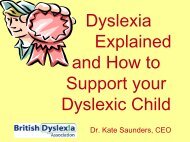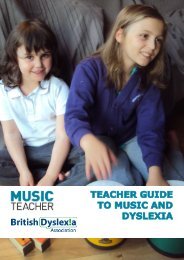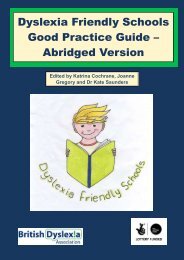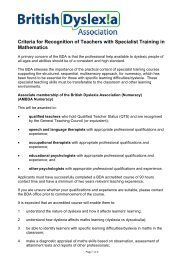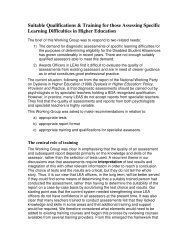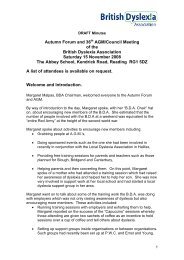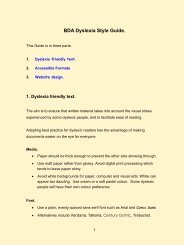Intervention for Dyslexia - The British Dyslexia Association
Intervention for Dyslexia - The British Dyslexia Association
Intervention for Dyslexia - The British Dyslexia Association
Create successful ePaper yourself
Turn your PDF publications into a flip-book with our unique Google optimized e-Paper software.
Reading Recovery had evidence of positive effect in all four domains. <strong>The</strong> other<br />
programmes known to be in use in the UK had evidence <strong>for</strong> only some domains:<br />
Accelerated Reader had positive evidence <strong>for</strong> comprehension and general reading<br />
achievement, Corrective Reading <strong>for</strong> alphabetics and fluency (but a null finding <strong>for</strong><br />
comprehension), and Success <strong>for</strong> All <strong>for</strong> alphabetics and general reading achievement<br />
(but mixed findings <strong>for</strong> comprehension). Graphs comparing the effects within domains<br />
showed that Reading Recovery had the highest of all impacts in alphabetics (from 18<br />
programmes), fluency (from 11 programmes) and general reading achievement (from 5<br />
programmes), and the third highest impact from 19 programmes <strong>for</strong> comprehension –<br />
but its impact here, in common with other programmes, was distinctly lower than in the<br />
other three domains. Among the programmes known to be in use in the UK but with no<br />
evidence meeting the WWC standards were Direct Instruction (<strong>for</strong>merly DISTAR),<br />
Letterland, ‘Pause, Prompt and Praise’, Project Read and SuccessMaker Reading.<br />
5.3 Reading Recovery in the UK<br />
5.3.1 Reading Recovery in the UK be<strong>for</strong>e Every Child a Reader (ECaR)<br />
Reading Recovery was introduced into England in Surrey LEA in 1990 (Prance, 1992;<br />
Prance & Wright, 1992; Wright, 1992). A further 20 LEAs in England adopted the<br />
programme as a result of government funding during the period 1992–95. Reading<br />
Recovery was also widely implemented in Northern Ireland. According to Hobsbaum<br />
(1997) about 70% of the children in England who received the full programme were<br />
successfully discontinued, with about 30% referred <strong>for</strong> further support.<br />
In their review of interventions <strong>for</strong> literacy difficulties, Brooks et al. (1998) examined<br />
evidence supplied by over a dozen local Reading Recovery initiatives in England, Wales<br />
and Northern Ireland, but found that ‘none of these reports provided either an impact<br />
measure or data from which such a measure could be calculated’ (p.37). <strong>The</strong> only report<br />
that satisfied appropriate scientific criteria was a study of Reading Recovery carried out<br />
over the period 1992–96 in six LEAs in London and in Surrey (see Section 5.4).<br />
Many LEAs which had taken up Reading Recovery with the help of government funding<br />
discontinued it later in the 1990s after funding ceased, although those that continued<br />
(such as Stockport and the London Borough of Hackney) claimed that the programme<br />
was beneficial (see Brooks, 2007, p.74). By 2001–02 the take-up of Reading Recovery<br />
had dwindled to the point that only 4,600 children in the UK and Ireland were receiving<br />
tuition (Douëtil, 2003). Annual monitoring reports of Reading Recovery in the UK and<br />
Republic of Ireland have been published by the Institute of Education, University of<br />
London (IoE), <strong>for</strong> the period 2002 to 2007; these also include data on children receiving<br />
Reading Recovery from 1993 onwards (see Douëtil, 2003, 2004, 2005, 2006, 2007a).<br />
<strong>The</strong>se show that the percentage of children who were successfully discontinued from<br />
the programmes (referred to in these reports as ‘having achieved accelerated progress’)<br />
rose from 70% in 1994–95 to 84% in 2006–07. Other than the annual monitoring<br />
reports there are few studies in the period that generated data useful to this review.<br />
However, Fudge (2001) studied 145 children in 21 schools in Bristol which were using<br />
the Reading Recovery programme during 1999–2001, and reported an average ratio<br />
gain of 2.9.<br />
104 <strong>Intervention</strong> <strong>for</strong> <strong>Dyslexia</strong>



